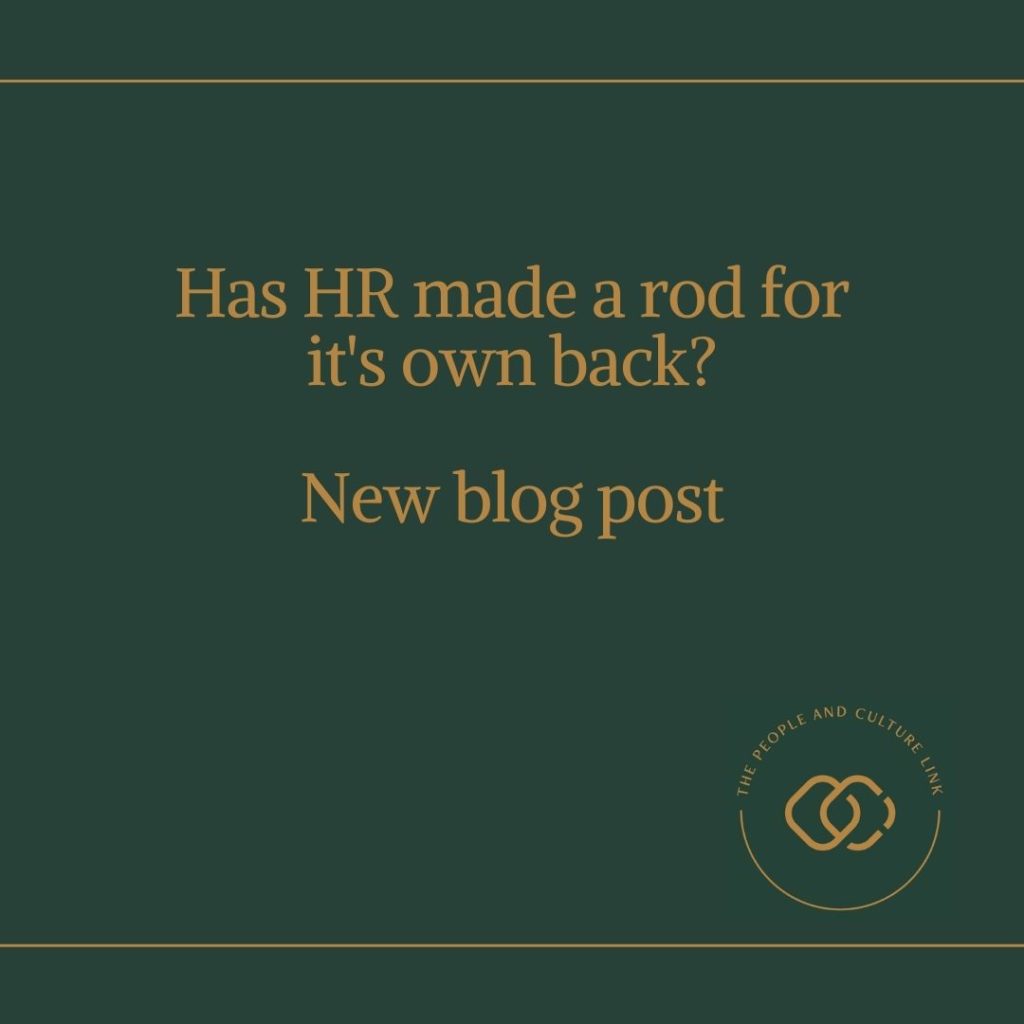Has HR made a rod for their own back?

There’s no denying that the Human Resources (HR) department holds a pivotal place in all organisations. As the people ‘expert’ it is imperative that HR have a seat at the table and have a connection with the executive team. However, there is an intriguing, and somewhat contentious question: ‘Has HR made a rod for their own back?’
As a HR professional of 20+ years, this question has my brain in overdrive the last few years! Most people that have worked with me, know that my style is a little ‘different’ to the majority of my colleagues in HR – well that’s I’ve been told by many people over the years. Which is why I think this question does intrigue me a little.
‘Making a rod for one’s own back,’ typically refers to creating problems for ourselves as a consequence of our own actions. In the context of HR, this could involve policies or practices that inadvertently make the HR team’s work, those of line managers and therefore employees, more difficult or complex. The number of times people have said ‘this is to cover HR and won’t do anything to make things easier for the business’, or ‘so we have to do this so HR gets a tick in the box’ tells me that there is something ‘wrong’ somewhere. However, it really is about finding a solution that will work for everyone, which again in HR can be difficult.
While structure is essential in any organisation, excessive rigidity can cause more problems than it gives solutions. For instance, strict rules on working hours or the inflexible application of leave policies may initially seem beneficial for maintaining order, or being consistent, but how affective is it when implemented? Is it flexible enough for line managers to be able to manage their teams or does it cause more confusion and need constant HR clarification?
The other issue I see, is that policies/procedures have been created when an employee has done something wrong. Instead of managing the employee, we’ve created new policies/procedures to stop it happening again. What the? How about we don’t put every employee into the same ‘they’re all going to mess up one day’ bucket but manage the employee that has done the wrong thing, whatever it is. Sound familiar?
All of the above, can lead to employee dissatisfaction, increased turnover, and subsequently, more recruitment and work for HR. Not to mention the line managers that have to keep up with it all.
How many times have you heard people say ‘HR said we can’t do that’, ‘HR said no’, ‘I’ll have to get permission from HR before I can give you approval’?
In some instances, line managers could easily have made the decision and there’s a couple of reasons (there would be a few more no doubt) they didn’t:
a) line managers have a perception that their authority has been removed & only HR can make those decisions;
b) line managers are worried that they might get into ‘trouble’ from HR for going outside of policy/procedure;
c) line managers haven’t had appropriate leadership training on how to make these decisions;
d) line managers are using HR as the scapegoat to keep their relationship with their teams.
I totally agree that companies need policies and procedures. But by making them so regulated/strict with no flexibility means that they either won’t be used at all or there’s so much extra time that needs to go into managing the policies and procedures, it takes HR and managers, away from being proactive.
We become so tied up in circles managing our own policies that we have created that we are then constantly focusing on reactive responses rather than proactive strategies. Then adding to that, our leaders aren’t sure how to, or what they are ‘allowed’ to manager so revert to the ‘I’ll have to check with HR’ which reinforces HR as the bad guy. Vicious circle isn’t it?
So, the question remains: ‘Has HR made a rod for their own back?’ The answer could be both yes and no. Yes, if they continue to develop rigid policies & cling to outdated practices.
No, if they recognise these potential pitfalls and take proactive steps to avoid them. So how do we do that?
There are many different strategies we can use, but firstly, we need to start treating our managers as managers and encourage them to manage within a framework. We need to start treating our employees as adults and manage them when they don’t do the right thing. Don’t put frustrating policies in place because a small percentage of your workforce have done the wrong thing.
Engage the workforce for feedback in development of policies/procedures, ask the managers if this will work for them. Ask yourself are you writing this from a controlling perspective, or does it have flexibility for managers to manage their teams?
The role of HR is indisputably critical, and it’s crucial for them to continually reassess and evaluate their practices. By avoiding the creation of unnecessary ‘rods,’ HR can get back to working as a key strategic player sitting at the table.
As always, interested in your thoughts either below or by sending me a message.
